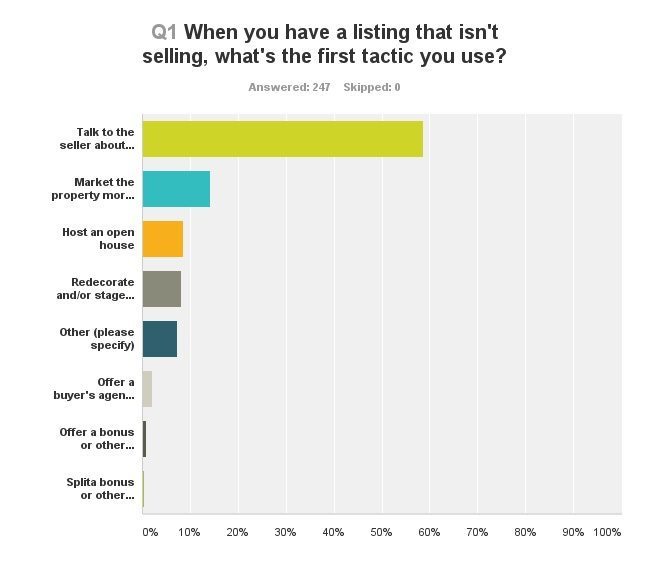- The stress of reducing a home's price can be somewhat relieved by educating potential sellers beforehand.
- Although the majority survey respondents said reducing the price is the first tactic they apply to a stalled sale, they also recommended exhausting all your options.
Your hands are sweaty, your throat is dry and your heart is pounding as you approach your listing clients to talk about something they’re not going to like: reducing the price.
Take solace in the fact that you’re not alone. A whopping 58 percent of respondents to Inman’s recent poll indicated that a price adjustment is the first tactic they use when a home just isn’t moving.
The other options listed were:
- Market the property more aggressively
- Host an open house
- Redecorate and/or stage the home
- Offer a buyer’s agent bonus
- Offer a bonus or other financial incentive, like covering closing costs, to the buyer
- Split a bonus or other incentive between the buyer and the buyer’s agent
So, what is the best way to have the difficult — yet sometimes necessary — price-reduction conversation?
When you first take the listing: Educate your sellers
A few respondents noted that the strife of reducing a home’s price can be relieved by educating potential sellers about the current market conditions and trends during the listing presentation and once again when they’ve hired you to be their agent.
A survey respondent shared a script to get the ball rolling, writing:
“m/m Seller, a very important part of our conversation today is a full-on discussion of exactly what is going on in this area right now and predicting where it may be in 60-90 days. I know you are talking with other Realtors and it is very important that we take a close look at this, the reality of pricing and inventory in your area.
“Realtors not willing to fully discuss these trends before your house goes on the market are, quite possibly, more interested in having their sign in your yard than they are in getting your house sold or they are willing to put off the hard conversation because they simply want you happy today. You see, it’s important that we have this discussion now versus you not liking me 90 days from now when your house has not sold and I keep pushing for a price reduction.”
According to other survey-takers, the CMA (comparative market analysis) should include:
- How many months of supply is available? (And what does that mean?)
- The average number of days that homes are on the market in the area
- Prices of comparable homes for sale in the neighborhood
- Neighborhood statistics, such as the number of active listings, sold listings and expired listings
After presenting the initial CMA, it’s the perfect time to talk about and agree to price reduction guidelines, said survey takers.
In his Inman article, “The price reduction strategy that saves agents during a downturn,” 27-year real estate veteran Pat Hiban says the guidelines should be simple and straight-to-the-point — no beating around the bush.
He offers this short script to use with sellers: “If we don’t have a strong second showing or offer in the first 10 to 14 days, then the market is telling us we are overpriced and we are going to price at $X.”
Then, he says, place that guideline in the listing agreement so you and the seller can refer to it if you need to reduce the price.
Lastly, tell your sellers you will be giving them monthly CMAs to update them about the state of the market so they can remain apprised.
Then follow through with weekly updates about what you are currently doing to help move their property and what you plan to do in the upcoming days and weeks.
Before you decide to have the price-reduction talk: Exhaust your other options
Although a price reduction is effective in moving a home off the market — and most respondents said it was the first thing they’d do if a house wasn’t moving — respondents also were adamant that it shouldn’t be your first course of action.
In fact, according to many respondents, it should be one of your last resorts.
- As one respondent said: “A home fails to sell for one of three reasons: price, exposure and appeal. The seller controls the two main ones (price and appeal).” Talk to your sellers about any additional “boosts” they can give the home through more thorough cleaning, a little redecorating or small (cheap) improvements.
- Ask for post-showing feedback from the buyer’s agents who’ve shown the home.
- Host a broker’s open house and ask for feedback there.
- Ask a couple of trusted, educated colleagues to walk through the house with you and offer their feedback.
During the price-reduction talk: Emphasize information in the CMA
If you’ve tried the aforementioned suggestions and the home still isn’t selling, it’s time to reduce the price.
Pull out the price-reduction guidelines from the listing presentation and go over them again with your seller. In addition to going over the guidelines, present an updated CMA and go over other options.
- Look at online listing activity and compare it to the number of people who have actually toured the home.
- Look at your competition — are other homes also not selling, or is it just yours?
- Look at comparable sales in the area and neighborhood statistics.
- Offer other suggestions — some in the survey included buyer’s agent or buyer bonuses, hosting an open house or marketing the property more aggressively.
From there, respondents said the key to success is staying calm and effectively communicating with your seller at every twist and turn.
As one survey taker noted: “Don’t panic!”













